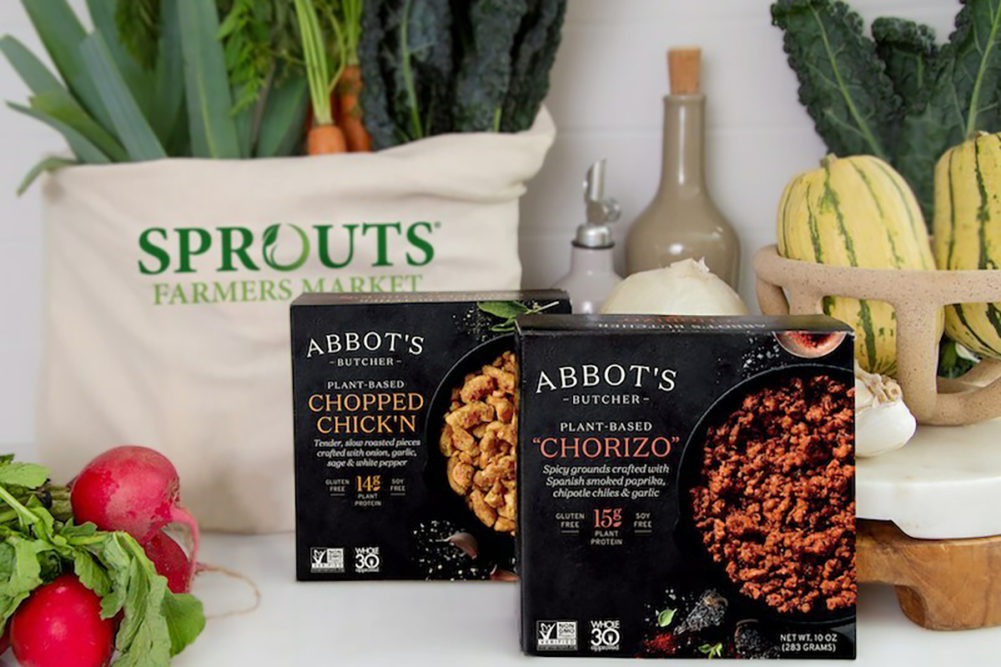By 2030, the global plant-based meat market is expected to increase to $24.8 billion at a compound annual growth rate (CAGR) of 24.9% from 2023 to 2030, according to a report published in April by San Francisco-based Grand View Research, Inc.
“The growing concern of consumers regarding animal welfare and greenhouse gas emission created by the distinguished practices of the meat industry, together with celebrity endorsements of vegan/vegetarian diets are projected to augment the demand for plant-based meat products in the global market,” according to the report.
The report also identifies the COVID pandemic as a main driver of the plant-based category because it has led consumers to become more health-conscious. This specifically applies to the burger category as consumers see plant-based burgers as a healthier option than traditional beef burgers.
The current top three ingredients for plant-based meats are soy, pea protein and wheat, with soy taking the lead.
“Soy-based product segment accounted for more than 48.55% of the revenue share in the market in 2022, owing to its protein-rich content and widespread popularity,” the report said.
A global market report on soy protein from Dublin-based Research and Markets released in April predicted a CAGR of 9.8% for the global soy protein market.
“The market's revenue growth is propelled by several factors, including an increasing number of fitness enthusiasts and a trend toward healthy eating habits,” the report said. “Additionally, the market is driven by a growing working population and a rise in the number of vegans. Soy protein is a complete source of protein found in soybeans, containing 90% protein, and helps with weight loss, muscle building and energy increase. Soy protein is comparable to animal proteins like eggs, chicken and dairy products and caters to the protein requirements of vegans, vegetarians, and flexitarians. Consumer awareness of the benefits of soy protein is increasing, which is expected to positively impact market revenue growth. Soybeans contain fiber, zinc, iron, calcium, B vitamins and all eight essential amino acids.”
According to the Grand View Research report, the most popular varieties of plant-based meats include:
- Burgers
- Sausages
- Patties
- Nuggets, tenders and cutlets
- Grounds
“The plant-based sausage segment is projected to ascend at a CAGR of 26.8% over the forecast period,” Grand View Research said. “Shifting consumer inclination towards plant-based diets and rising consumption of sausages via retail channels on account of taste, texture and convenience are anticipated to spur product demand across the globe.”
Grand View Research listed the following as key players in the plant-based market:
Beyond Meat
- Impossible Foods Inc.
- Maple Leaf Foods (Field Roast & Maple Leaf)
- Vegetarian Butcher
- Conagra, Inc. (Gardein Protein International)
- Kellogg NA Co. (MorningStar Farms)
- Quorn
- Amy's Kitchen, Inc.
- Tofurky
- Gold&Green Foods Ltd.
- Sunfed
- VBites Foods Limited
- Kraft Foods, Inc.
- Lightlife Foods, Inc
- Trader Joe's
- Yves Veggie Cuisine (The Hain-Celestial Canada, ULC)
- Marlow Foods Ltd. (Cauldron)
- Ojah B.V.
- Moving Mountains
- Eat JUST Inc.
- LikeMeat GmbH
- Gooddot
- OmniFoods
- No Evil Foods
- DR. PRAEGER'S SENSIBLE FOODS
Innovative ingredients
Dublin, Ohio-based Matrix F.T. is a food tech company that develops animal component-free and customizable scaffolds and microcarriers for the alternative protein industry. On March 9, the company hosted an invite-only tasting event for industry leaders, policy makers, investors and economic development professionals.

One of the featured foods was a plant-based sausage cooked with a Matrix F.T. fat and oil replacer. It was served alongside a plant-based sausage cooked without the ingredient for event attendees to compare the two.
"The difference was clear: the sausage with Matrix F.T.'s product was juicy, had great mouthfeel and enhanced the overall flavor,” said one of the guests.
The event also showcased how Matrix F.T.’s products could be used to create a new kind of alternative protein that is a hybrid of plant-based and cultivated meat with a cultivated chicken bite.
Matrix F.T. partnered with a university to obtain chicken myoblasts that the company cultivated on its animal component-free and edible microcarriers. The cultivated chicken was then added to a plant-based chicken bite recipe.
"This was an important milestone for everyone in the room — for Matrix F.T. as a company, for our industry and of course for the State of Ohio,” said Teryn Wolfe, CEO of Matrix F.T. “Although Matrix F.T. does not make cultivated meat, nor do we intend to do so, showing a proof of concept and our expertise as materials engineers, cell culture scientists and food scientists is critical to proving that the cultivated meat industry is ready to scale — and that it is possible at scale with our products."
Vegan curiosity
Petaluma, Calif.-based Amy’s Kitchen recently surveyed 2,007 adults across the United States on their feelings about plant-based diets.

Conducted by Atomik Research Feb. 16-18, the survey included 1,003 parents of children younger than 18 and 1,004 adults who do not have any children younger than 18 living at home.
The survey found that 52% of Americans are “vegan-curious,” and for the group of just parents, they were even more so (66%).
“With more than 100,000 internet searches per month for "vegan recipes" and "vegetarian recipes,” it's clear there is high demand for plant-based meals,” Amy’s Kitchen said.
The top three reasons those surveyed gave for their vegan curiosity were:
- Health (55%)
- A desire to protect the environment (34%)
- A preference for the taste of plant-based ingredients (28%)
The main holdup for the vegan-curious consumer was found to be the lack of convenience. Among the parents, 66% said it was difficult to come up with family-friendly meals that they felt good about serving to their kids but were also convenient.
These survey results might inspire retailers to highlight convenience in their plant-based meat sections. Stores can offer easy recipe ideas featuring a variety of plant-based products and use that as an opportunity for cross-merchandising with the other ingredients found in-store.
Supplier news
Conagra Brands
In April, Chicago-based Conagra Brands published its third quarter results ended Feb. 26. The report mentioned that the company gained share in both the plant-based protein and breakfast sausage categories, and net sales for the company’s overall refrigerated and frozen segment increased by 5.6% to $1.3 billion.
Hormel Foods
Austin, Minn.-based Hormel Foods Corporation brought some unique pizza toppings to the Pizza Expo March 19-21 in Las Vegas.
Kyle Flottman, a brand manager at Hormel, identified the use of non-traditional ingredients as one of the top five trends for pizza in the next few months. One example that Hormel showcased at the expo was its plant-based pepperoni.
“Happy Little Plants pepperoni-style topping offers the burst of flavor people love and expect from real-meat pepperoni, but with a plant-based spin,” the company said.
Abbot’s Butcher
In April, Costa Mesa, Calif.-based Abbot’s Butcher launched in all 370 Sprouts Farmers Market stores.
"Launching with Sprouts is an incredibly exciting step for us," said Kerry Song, the company’s founder and CEO. "There is an undeniable shift taking place in how consumers are thinking about their food, and they are actively seeking out food made with ingredients that truly nourish their bodies. Sprouts is a grocer they trust to feed themselves and their families, and we are honored to be a part of that."
The two products being sold at Sprouts are Abbot's Butcher’s refrigerated plant-based "Chorizo" and Chopped Chick'n, which retail at $7.49.
“All of Abbot's Butcher premium proteins are made with 100% real food ingredients and are free from soy, gluten, preservatives, natural and artificial flavors, canola and the top nine allergens,” the company said. “The products are also Non-GMO Project Verified, Whole30 approved and Vegan Certified. Abbot's Butcher plant-based meats are made for the modern kitchen—clean, convenient, and above all, craveable.”
Also sold at The Fresh Market, Fresh Thyme and select Targets and Whole Foods Markets, Abbot’s Butcher is proud to be the only brand of the top 10 refrigerated plant-based meat companies to have positive growth through the last 4-, 12-, 24- and 52-week timeframes, according to SPINS data.
The company believes its success is due to consumers becoming more diligent with researching and understanding what their food is made of and which plant-based products are actually healthy versus those that are more processed.
"Food is information, and every bite of food you take is an opportunity to promote healing or promote imbalance,” Song said. “At Abbot's Butcher, we're deeply committed to crafting plant-based proteins that not only taste absolutely delicious but give your body what it needs to thrive.”
Impossible Foods
In March, Redwood, Calif.-based Impossible Foods launched a leaner version of its Impossible Beef called Impossible Beef Lite.

The company advertises the new product as better than lean ground animal beef for consumers’ health and also a more sustainable product with less land and water usage and fewer greenhouse gas emissions.
"We’re constantly working to compete with beef in all of the ways that matter to consumers, including nutrition,” said Peter McGuinness, president and CEO of Impossible Foods. “A lot of health-conscious fans and shoppers are looking for a plant-based beef option that’s high in protein and nutrients with even less fat, and Impossible Beef Lite is our solution to that. It’s got 21 grams of high-quality protein, a whopping 75% less saturated fat than lean ground beef from cows, and of course no cholesterol. It's a perfect plant-based way to customize all of the great recipes that call for lean animal ground beef."
In February, Impossible Foods also launched three new frozen plant-based chicken products — Impossible Spicy Chicken Nuggets, Impossible Spicy Chicken Patties and Impossible Chicken Tenders.

